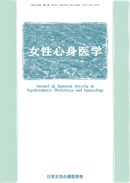【Purpose】 To assess the effect of prenatal genetic testings (PT) and genetic counseling (GC) on the mental stress of pregnant women and after childbirth women, We examined about factors related with stress, anxiety and depression in after childbirth women who received GC for PT. Questionnaire to evaluate stress factors, the anxiety and depression was performed twice in women who did NIPT at the time of PT and 1 year after the testing.
【Methods】 We subjected 468 women who received NIPT and got negative results nine month from July 2014. After childbirth, we sent questionnaires, including a psychosocial factor evaluation tag and HADS (Hospital Anxiety and Depression Scale). Statistical analysis was performed by using variance analysis.
【Result】 The recovery rate was 77.8%, and 89.9% of respondents felt satisfaction to NIPT.
In addition, 73.1% of women replied they will do the NIPT on the next time of the pregnancy. 96% of respondents reportedly understood NIPT after the GC well, and had opinion that GC were necessary (P<0.0001). Stressors including matters of “herself, child, husband, and the other things” showed a tendency to increase after childbirth. The satisfaction about the relations with the husband significantly decreased after childbirth (P<0.0001, coefficient of correlation 0.46). Stress VAS significantly decreased from 46.8±21.2 to 42.4±26.8, in that when received NIPT to after childbirth (P<0.0102 coefficient of correlation 0.39). HADS-A, -D did not have a change after childbirth.
【Conclusion】 Since pregnant women who received GC for PT and done NIPT were satisfied with the testing and felt the need of the GC, it was thought that the establishment of GC system which could support the decision regarding to the prenatal testing would be important. Increased tendency in stress factors including the nursing, a physical condition change, the return to their work were observed after childbirth. The satisfaction to a husband decreased. Since stress VAS decreased after childbirth, GC for PT may contributed to decrease the stress VAS after childbirth. Especially in women with high score of HADS, tendency to have anxiety and depression, and have high score of stress VAS was observed after birth. The psychosocial stress of these women was associated with their own factors. It is indicated that careful genetic counseling including physical and mental supports is very much important for these women before the NIPT and after the childbirth.
View full abstract
